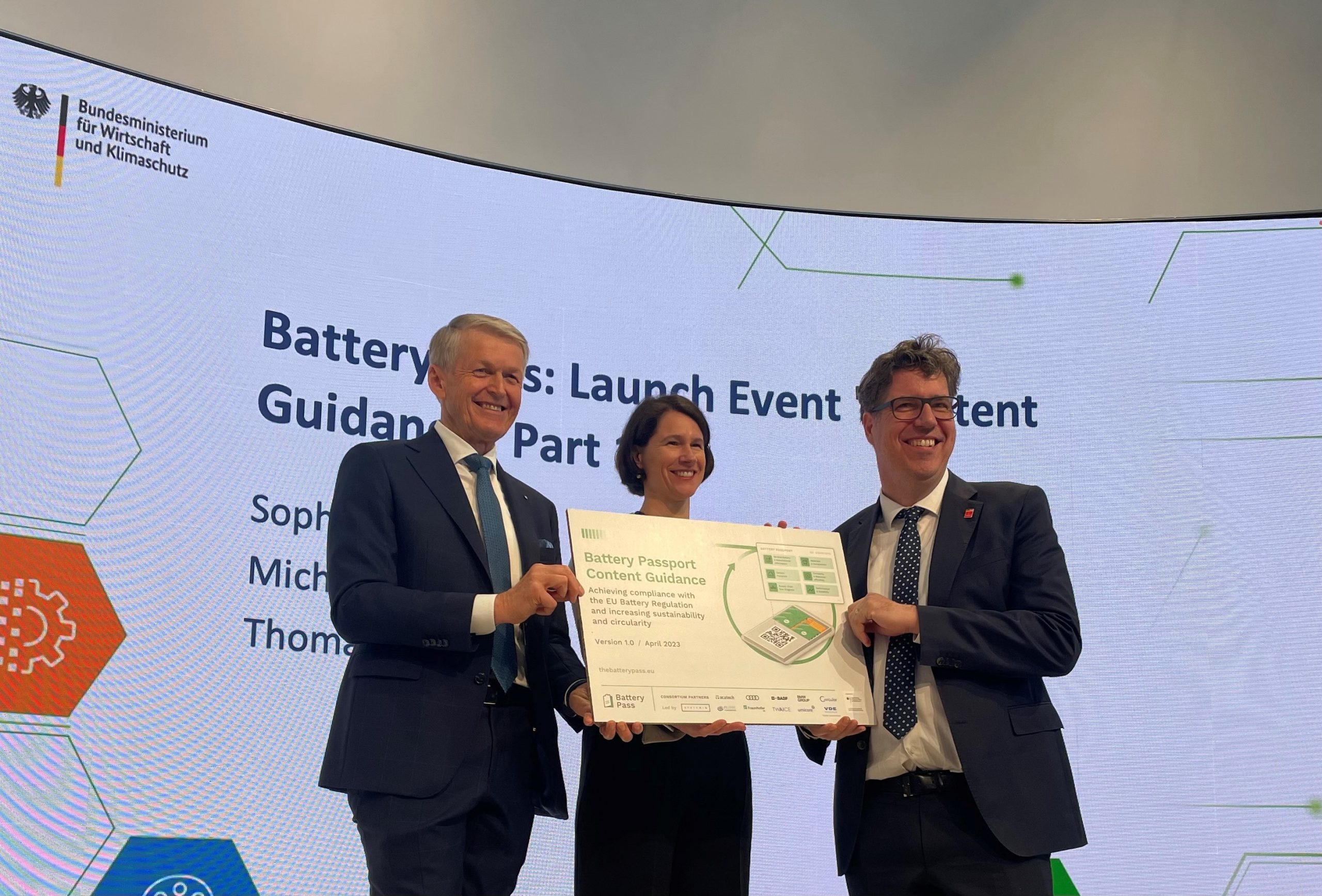April marks an important milestone for the Battery Pass with the consortium having launched the first publicly available “Battery Passport Content Guidance” which aggregates and interprets the content requirements for the upcoming EU Battery Passport. It aims to provide a timely and comprehensive guidance on how to achieve compliance with the Battery Regulation while enabling increased sustainability and circularity.
The Content Guidance was officially revealed on 17th April 2023 during a ceremony at Hannover Messe as part of the German Federal Ministry for Economic Affairs and Climate Action’s stage program on “Sustainable battery cell production – a cornerstone for the climate-friendly mobility of the future”.
With more than 50 participants on site as well as approximately 200 joining online via livestream, the event was extremely well attended, underscoring the importance of the topic for the industry and broader ecosystem.
The program was kicked off by a thematic introduction by Uwe Seidel, Head of Section Systemic Environmental Innovation and Industrial Policy and Programme Management IPCEI Battery, VDI/VDE-IT, who highlighted that the European battery ecosystem is enjoying growing importance yet is facing major challenges.
Afterwards Sophie Herrmann, Partner at Systemiq, and Prof. Dr.-Ing. Thomas Weber, President of acatech – National Academy of Science and Engineering, officially handed over the Content Guidance to Michael Kellner, Parliamentary State Secretary, BMWK.
Michael Kellner pointed out the relevance of the battery passport, stating:
“Firstly, the CO2 reduction potential of electric cars crucially depends on how these batteries are produced. Secondly, the severe social impact and raw material issues associated with battery production need to be addressed. And finally, circularity is essential to ensure the batteries can have a second life, be recycled, and the resources used to build new batteries – and for all that we are working on this battery passport.”
Sophie Herrmann and Prof. Dr.-Ing. Thomas Weber acknowledged the support of the Ministry as well as the contributions of the consortium partners, highlighted the importance of the Content Guidance and provided an overview on the objectives, scope, and value potential of the battery passport.
Sophie Herrmann and Prof. Dr.-Ing. Thomas Weber acknowledged the support of the Ministry as well as the contributions of the consortium partners, highlighted the importance of the Content Guidance and provided an overview on the objectives, scope, and value potential of the battery passport.
From left to right: Prof. Dr.-Ing. Thomas Weber, President, acatech – National Academy of Science and Engineering; Sophie Herrmann, Partner, Systemiq GmbH and Program Director, Battery Pass Consortium; Michael Kellner, Parliamentary State Secretary of the Federal Ministry for Economic Affairs and Climate Action (BMWK).
The event continued with a panel discussion on the impact of the Battery Pass consortium to the overall agenda of introducing digital product passports including core achievements and challenges. The panel comprised industry experts including:
- Ilka van Dalwigk, European Battery Alliance Policy Manager, EIT InnoEnergy
- Dr. Franz Geyer, Head of Collaboration Zero Emission Mobility, BMW Group
- Uwe Seidel, Head of Section Systemic Environmental Innovation and Industrial Policy, VDI/VDE-IT
- Dr. Torsten Freund, Head of Project Management Office Battery Passport, Global Battery Alliance
The discussion was moderated by Stephanie Schenk, project lead of the Battery Pass consortium at Systemiq, and Johannes Simboeck, team lead for the battery passport at acatech.
From left to right: Dr. Johannes Simboeck, Stephanie Schenk, Ilka van Dalwigk, Dr. Franz Geyer, Uwe Seidel, Dr. Torsten Freund
During the lively discussion, the experts highlighted the Battery Pass project’s first-mover status in publishing a guidance for the European and global industry, stressed the importance of synergy effects and acknowledged the success in achieving harmonisation with other initiatives.
Furthermore, the panel participants emphasised the need to consider the implementability of the battery passport by small and medium-sized enterprises, to go beyond pure compliance and to approach the topic globally rather than purely with an EU focus.
Opening the Q&A, the audience was particularly interested in questions related to the specific reporting requirements of the EU Battery Regulation, in details regarding the cooperation with other initiatives such as GBA and Catena-X as well as standardisation efforts.
The event was a great success, generating significant interest and excitement for the Battery Pass project. More than 60 media outlets picked up on the publication of the Battery Passport Content Guidance including Reuters, Die Welt, and Der Tagesspiegel conducting interviews and reporting on the Battery Pass project.
Over the coming months, the Battery Pass will be hosting a series of open webinars that will delve deeper into the content of the guidance and provide a platform for the ecosystem to address further questions and exchange. Following the content focused work, the Battery Pass consortium will now increasingly shift its focus to the technical workstreams and value assessment of the passport.



